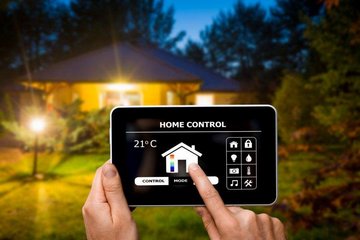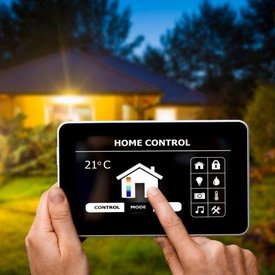Home Smart Home
Alexander Schaper is a specialist in electrical and information technology trades(specialist planner) and owner of the consulting and planning company tsbc – the smartbuilding company in Stuttgart. Since 2008, he has been the Managing Director of the SmartHome Initiative Deutschland e.V., which he founded. Scout24 talks to him about the trends, the pioneers and of course the “smartness” of his own home. For more information about the use of smart home in Germany, check out Scout24’s study on this topic: www.scout24.com/futuretrends (German)
1. Mr. Schaper, you are an expert on “Smart Home” and know the latest developments but what about your own home? Is it also “smart”?
Alexander Schaper: In fact, it has been smart since 2006. The “smartization” began with a solid hybrid installation, i.e. a part has been made smart by a redevelopment. Many cables were laid and another part of the building had been rebuilt electrotechnically on a regular basis in previous years. Radio-networked sensors and actuators were installed there. The cable- and radio-networked components are integrated via HomeServer (eibPort), i.e. whether it is light, air conditioning or heating control – all these things are interconnected to each other and have been already like this for ten years. You could almost say that the building has already slowly entered the “smart” age.
2. What do you think? Who are the most important pioneers in the “Smart Home” area?
Alexander Schaper: Let’s take a look into the past. I think the basic pioneers were the companies who founded Insta (German). Previously, there was the so-called EIB (European Installation Bus). They are now known as KNX, and I believe it was the first group of people in Europe who deal with the topic of intelligent homes and still do so today. I guess, afterwards, one of the great pioneers was the interplay between EQ3 and RWE (today innogy). In my opinion, they have defined and shown the breakthrough which we are benefiting today: smart home does not have to be highly complex, but comprehensible and manageable for the average consumer. It was the first time the issue had been introduced into society and, above all, pricing in a region that more or less everyone could afford. They also created stories about it. They didn’t show the high end but rather how the average consumer lives. In my opinion, it was a very great pioneer achievement.
3. One result of the study was that privacy and cyber security play a very important role in the use of Smart Home. What do you have to look out for?
Alexander Schaper: You have to differentiate. The danger of those cyberattacks is currently not very high but you have to take the topic very seriously. When I deal with “Smart Home” and the use of mobile devices, the most important rule is that I am concerned not only with the security of “Smart Home” products but also with the seriousness of the security of my home network and my mobile devices. Most “Smart Home” components are almost too primitive for being hacked. Usually the bottleneck is at the Smart Home centers, which are often directly connected to the Internet. Therefore you should secure all “contact point” to the Internet. In other words: Use an anti-virus software on smartphones and tablets and a reasonable safeguarding of the home network. Here I would recommend reading up-to-date reviews because the number of test winners is steadily increasing.
4. How do you see the international use of “Smart Home”? Is Germany far ahead? How do you assess the current situation?
Alexander Schaper: It’s very different. I would say that we have to differentiate again. There is a company called CONTEXT World Limited from England, which carries out market research. The company has conducted a study and found out that Germany is a market leader in Europe as well as in the number of products. In fact, I would point out from my findings that the Asian region is significantly faster. If you take a look at South Korea or Japan, these countries have significantly higher levels of crosslinking, but it is also industry-driven. The advantage is that they have large diversified conglomerates that can supply everything from refrigerators to energy storages. If they conduct a field test, for example, more than 1,000 households will usually be equipped and they will see what happens. This, of course, automatically ensures a high distribution. In addition, I also think that they have a higher affinity for technology. Especially your last question has shown that in Germany the issue of security is rated much higher than in many other countries. In America, for example, the technological level of equipment in the households is very high, but things are not integrated and little interlinked. In Europe, it is more on the focus. Therefore, I would say that the international use of smart home is growing steadily.
5. Let’s talk about the future. How will we live with a “Smart Home” in 2025? What will be possible?
Alexander Schaper: In fact, I believe that by 2025, things have actually manifested about which we are talking at the moment. I do not believe that life or living will change very much. We must also see that 2025 is not so far away. We will likely need even longer until “Smart Home” has moved into all households. I am of the opinion that, for example, the introduction of “Alexa” by Amazon will have a strong impact on “Smart Home.” As a result, new product types will be created which facilitate this crosslinking. Many end-consumers will search for, find and expand their core discipline such as heating, lighting control, etc. I believe that we will need much longer than 2025 to completely network and “smartize” the “SmartHome”, which is infrastructurally dominated.

